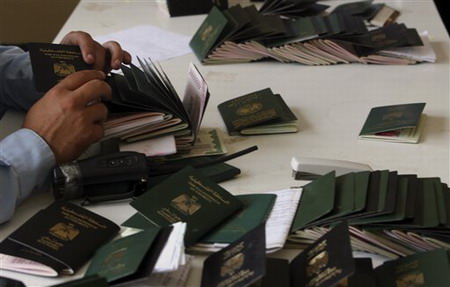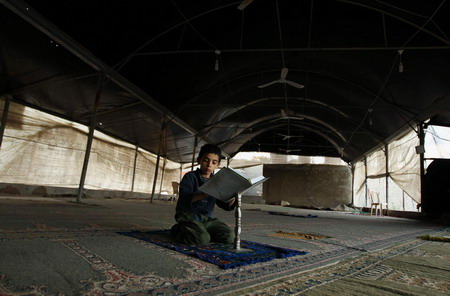Global General
Anxious Gazans trying to leave blockaded Strip
(Agencies)
Updated: 2010-06-09 11:18
 |
Large Medium Small |
|
 A Hamas police officer checks passports of Palestinians waiting to cross to Egypt, at Rafah border crossing, southern Gaza Strip, on June 8, 2010. [Agencies] |
Najwa Asmar and her three children failed to cross Tuesday, their second attempt in two days, but were promised they would get on the first bus Wednesday.
"Of course, I'm disappointed. For the last three days, we didn't get any sleep or rest," Asmar said as her teenage son Mohammed loaded their suitcase onto the roof of a taxi for the 45-minute drive back to Gaza City. Asmar hopes to spend the summer with Egyptian relatives she hasn't seen for years.
Nearby, 77-year-old Adnan Mohanna stood in the sun, waiting for word from Egypt that he was cleared to travel.
Mohanna and the others were visibly frustrated, but just shrugged when asked whom they blamed for their predicament, apparently fearful a critical word might jinx their chances of getting out of Gaza.
An Egyptian border official said about 500 Gazans, or seven busloads, are to be allowed to leave every day. Senior Hamas officials are banned from traveling, according to Egyptian officials.
Egypt has cooperated with Israel in enforcing the blockade, in part because it has been fighting homegrown Islamic radicals since the 1990s and feared Hamas' militancy could spill into Egyptian territory. However, Egypt's role in maintaining the blockade has hurt its standing in the Muslim and Arab world.
In recent days, Egypt has tried to shift responsibility for the blockade to Israel. Egypt's renewed promise on Monday to keep the Rafah terminal open came as US Vice President Joe Biden met with Egyptian President Hosni Mubarak and called for new ways of dealing with Gaza.
On Tuesday, Israel rebuffed calls led by Turkey for an international inquiry into what caused last week's deadly raid, saying it would conduct its own investigation.
Israel staunchly opposes a complete opening of the Gaza border, fearing that would strengthen Hamas, branded a terror group by the West, and allow the Islamic militants to bring in weapons, including missiles that could hit all over Israel.
However, Israel has suggested it is willing to expand the list of several dozen basic humanitarian items it has permitted into Gaza since 2007, while continuing to ban all exports.
Some in Gaza fear that in the end the international community, led by the US, will settle for only cosmetic adjustments.
Iyyad Saraj, a psychiatrist and leading figure among Gaza's independents, said partial solutions, such as a proposal by France to inspect aid ships before they reach Gaza, will only prolong Israeli control of Gaza's gates.
"If there is any kind of courage and leadership and moral standing, now is the moment to end the siege," he said.
|
 A Palestinian boy reads the Koran inside a makeshift mosque in the northern Gaza Strip on June 8, 2010. [Agencies] |



